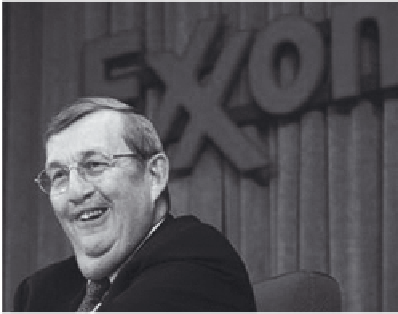Environmental Engineering Reference
In-Depth Information
Egregious Exxon
For years the most consistent energy-sector opponent of climate action
has been ExxonMobil. Indeed under Lee Raymond, its CEO between 1993
and 2005, Exxon almost seemed to delight in its villainous reputation
among the environmental community. It has been accused by America's
Union of Concerned Scientists of circulating deliberate disinformation on
climate change. “In an effort to deceive the public about the reality of glo-
bal warming, ExxonMobil has underwritten the most sophisticated and
most successful disinformation campaign since the tobacco industry mis-
led the public about the scientific evidence linking smoking to lung cancer
and heart disease”, said the scientists in their 2007 report. By “underwrit-
ten”, the scientists said they were referring to the fact that “ExxonMobil has
funnelled about $16m between 1998 and 2005 to a network of ideological
and advocacy organisations that manufacture uncertainty on the subject”.
Raymond's successor as Exxon CEO, Rex Tillerson, appeared to soften
the company's climate stance. In 2006 the Royal Society, Britain's oldest
and most prestigious scientific association, wrote to ExxonMobil asking
it to stop funding bodies that were putting out misleading information
on climate change. The Royal Society claimed that ExxonMobil had
promised to stop financing bodies that diverted attention from the need
for cleaner energy.
While ExxonMobil has always been the environmentalists' villain, its
solidly reliable finan-
cial and technical per-
formance has made it
the darling of oil com-
panies for investors.
In financial terms it
has consistently out-
performed its closest
rivals, BP and Shell.
One reason might
be that, alone among
oil majors, Exxon
has not until very
recently invested in
any renewable energy
projects (which, as
explained in chapter
Lee Raymond, former CEO of ExxonMobil, argued
that the company, with its technical and financial
strength, could afford to let others take the lead on
renewable energy but still catch them up if or when
renewables proved commercial.
































































